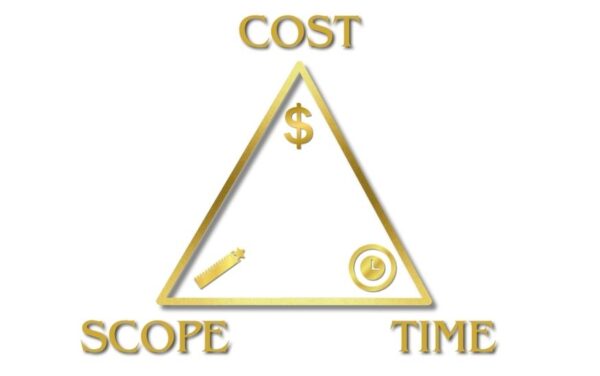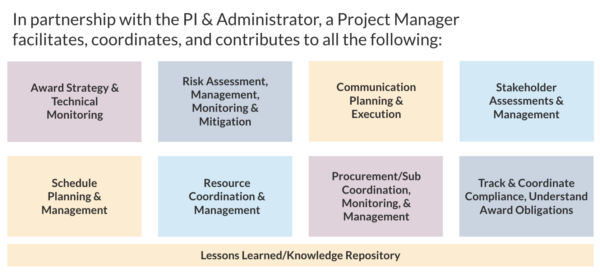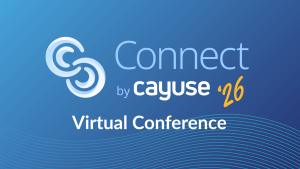Blog
Project Management in Sponsored Projects
- Healthcare
- Higher Education
- Life Sciences
- Nonprofit
The complex network of collaborators involved in sponsored research often requires careful management to ensure the accurate and timely completion of projects. During the 2024 Connect by Cayuse Virtual Conference, the University of Colorado Boulder’s Nicole Carleton, the University of Nevada, Reno’s Erica Hall, and the University of Notre Dame’s Nicole Quartiero discussed their experiences and strategies for effectively managing sponsored research teams.
In this blog, we’ll review their key insights on what project management means, why it is important in research settings, how it differs from project administration, and how teams can take advantage of a project management mindset even without a designated project manager.
Project management basics
To help put things into context, think of a project as a road trip; a temporary journey with a specific destination in mind. With any research project, you know where you’re starting and you should know where you hope to end. Everything in between, however, will need to be determined in order to reach your destination — preferably on time and on budget.
A project manager is exactly what the title implies: someone who manages the research project. True project management requires the application of fundamental tools, principles, and applications to help a project meet its objectives.
Returning to the road trip analogy, a project manager is like the trip’s navigator. They’re the one with the map, keeping track of time and stops and adjusting routes if there’s an obstacle or detour.
The golden triangle
The golden triangle, or triple constraints, is an essential core element of all project management. It refers to the three interconnected core elements of any project: cost, scope, and time.

If, during the course of a project, one of these elements changes, the others must change as well. For example, if you increase the scope of a project, you’ll also need to adjust the cost and time dedicated to it or risk suboptimal results.
Successful project management requires balancing the three points in the golden triangle in such a way that you can manage your project objective. This, of course, requires careful planning on the part of the project manager.
Planning your project
Planning often takes up the most time in the project management process, for good reason. With proper planning, teams have an easier time staying on track and managing unforeseen problems. In sponsored research, most of your planning will occur in the proposal writing phase.
Implementing an effective project management plan with your team time requires five important steps:
Setting appropriate goals to achieve results both the researcher and sponsor hope to accomplish.
Decompressing tasks by breaking your project into milestones and smaller, more manageable activities to give a better sense of the scale and time commitment required for each.
Increasing efficiency by establishing how your team will transition between tasks and activities. This will ensure that team members have a better understanding of what they need to do to move on to the next task even if unexpected challenges arise.
Considering institutional and external requirements by setting out the processes, policies, and documentation required from the start. This way, your team will be prepared for all necessary reporting to easily maintain compliance without disrupting workflows.
Identifying, mitigating, and reducing risk by creating contingency plans in the event of disruptions, no matter how likely or unlikely, so your team isn’t caught off-guard.
With everything in place, your team will hopefully achieve the final benefit of a well-planned project, increasing credibility with participants, departments, and even your institution as a whole when your carefully planned research project succeeds on time and on budget.
Management vs. administration
It’s important to keep in mind that, although there are similarities between the roles, there are key differences between project managers and research administrators.
At a high level, project managers are responsible for team management and strategy execution. They’re responsible for keeping track of objectives and goals, assigning roles and responsibilities, and keeping everyone on the same page. Returning to the road trip analogy, they’re making sure the car is big enough, the route is correct, and everyone is prepared to hit the road.
On the other hand, research administrators are responsible for task management and tactical/transactional tasks. These are more tactical and transactional tasks like proposal development, budget allowances, and invoice collection and negotiation. In the road trip example, they’re making sure there’s enough gas in the car, enough food, and emergency supplies like a jack and spare tire.
For the best results in a research setting, project managers and research administrators must work together in a synergistic partnership to ensure their team has both the high-level planning required to meet their goals and the resources and support needed to fulfill their individual roles.

Common challenges and project management solutions
To help put everything in perspective, there are several common challenges research teams face that can be addressed with proper project management:
Budget, time, and other resource constraints: Decomposition of tasks will help properly allocate resources, distribute costs, sequence required steps, and schedule milestones for tracking progress.
Unique institutional or regulatory requirements: Incorporating institutional and regulatory expert input during planning will ensure that no requirements are overlooked later in a project’s lifecycle.
Unrealistic expectations: Keeping key stakeholders engaged with clear communication throughout a project will prevent them from forming unrealistic expectations for the project’s scope, timeline, or goals.
Communication breakdowns: Planning and maintaining effective communication habits and strategies based on award and stakeholder management will prevent miscommunication.
Risk management: Early risk identification and mitigation strategies as well as ongoing risk management will prevent unpleasant surprises or noncompliance.
The project management mindset
Regardless of whether a funded award has an assigned project manager, PIs and project teams can still approach their work with a project manager mindset. By discussing, internalizing, and implementing the points covered in this blog, a team that keeps a project management mindset can expect:
More efficient workflows with better organization, planning for risks or changes, and clear goals.
Better relationships between a project’s sponsor, partners, and team members.
Trackable requirements established through a task or milestone list, an agreed-upon timeline, and actionable risk plans.
Remember, project management isn’t just about keeping projects on time and on budget; it’s also about fostering and managing clear communication, setting and managing realistic project expectations, and helping to protect the project and the study team from unforeseen challenges as best as we can.
Ready to establish a project management mindset at your organization? Learn how the Cayuse Research Suite helps improve collaboration, tracking, and efficiency across the sponsored project lifecycle.

